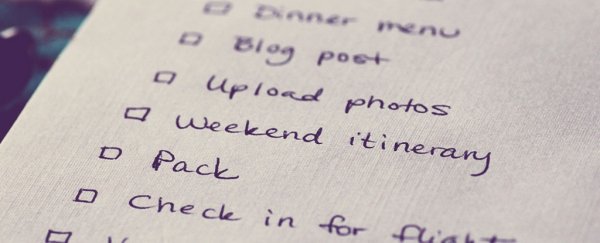Trying to keep on top of chores like work tasks, study, household jobs, and looking after the family can be difficult, but it's much easier if you write all your to-dos down somewhere. Whether you put reminders on your phone, use a calendar app, or just stick to a time-honoured pen-and-paper checklist, writing down the things you need to do helps clear your head so you can focus on the tasks themselves.
But, according to a new study, there's a limit to how much of our lives we should be calendarising in our schedules and to-do lists. Specifically, researchers at Washington University in St. Louis say we shouldn't bring a strict timetabling approach to leisure activities and general downtime, or we run the risk of draining the joy out of things that should otherwise be simply fun and relaxing.
In a new study to be published in the Journal of Marketing Research, the team describes the results of 13 different experiments that looked into how the simple act of scheduling leisure activities affects the way these events are subsequently experienced.
For example, in one experiment, the researchers gave student participants the opportunity to take a study break with free refreshments for a short time. One group of participants could elect to turn up at the study break whenever they wanted to indulge in the snacks, while another group was told they had to show up at a particular, designated time.
Unsurprisingly, surveys on how much the students enjoyed their study breaks showed that those who weren't locked in to a chosen slot enjoyed the downtime more – and, according to the authors, the same principle applies whenever we try to block out windows for leisure too tightly.
Researchers Selin Malkoc and Gabriela Tonietto examined the fun-killing phenomenon across about 25 different experiments, with 13 of the studies making up the data for their paper.
"Looking at a variety of different leisure activities, we consistently find that scheduling can make these otherwise fun tasks feel more like work and decrease how much we enjoy them," said Tonietto.
Malkoc drew inspiration for the study from an overseas holiday where she'd taken the time to schedule all the personal activities she wanted to do on the trip, including things like catching up with friends and family. While the strategy might have ensured a well-organised holiday timetable, the attention to detail had an unwelcome side effect.
"I soon started to feel reluctant and unenthusiastic at the prospect of the long-awaited reunions that I had scheduled," said Malkoc. "I began to think of each scheduled activity as more like an obligation, even a chore, rather than an enjoyable outing."
Over-organising our downtime isn't the only way scientists say we're impacting on how much fun we could be having. A study by Kent State University in 2014 found that the prevalence of smartphones in our lives eats into the quality of leisure time. Participants in that study who engaged in high daily smartphone use – as a means of leisure – reported that their time-filling was less satisfying and more stressful.
Research looking at the quality of our leisure hours is important, because the time we spend away from work can have an impact on our health. A 2013 study found that workers who were unable to manage professional interruptions during work hours found it hard to 'switch off' once the work day was over, taking a toll on their ability to relax and recharge during personal time.
According to the Washington University in St. Louis researchers, to maximise the fun of leisure time, the best approach for fitting downtime into an otherwise busy schedule might be timetabling your leisure – but doing it in as loose a manner as possible. This helps us to actually increase our chances of not missing out on the fun or relaxation, while not curbing our enjoyment of the activity too much.
"Roughly scheduling a leisure activity does not feel as structured, does not lead leisure to feel more work-like and thus does not reduce enjoyment," said Malkoc. "So it really is a balancing act," added Tonietto, "and it comes down to knowing what you will gain and lose when you schedule fun activities."
